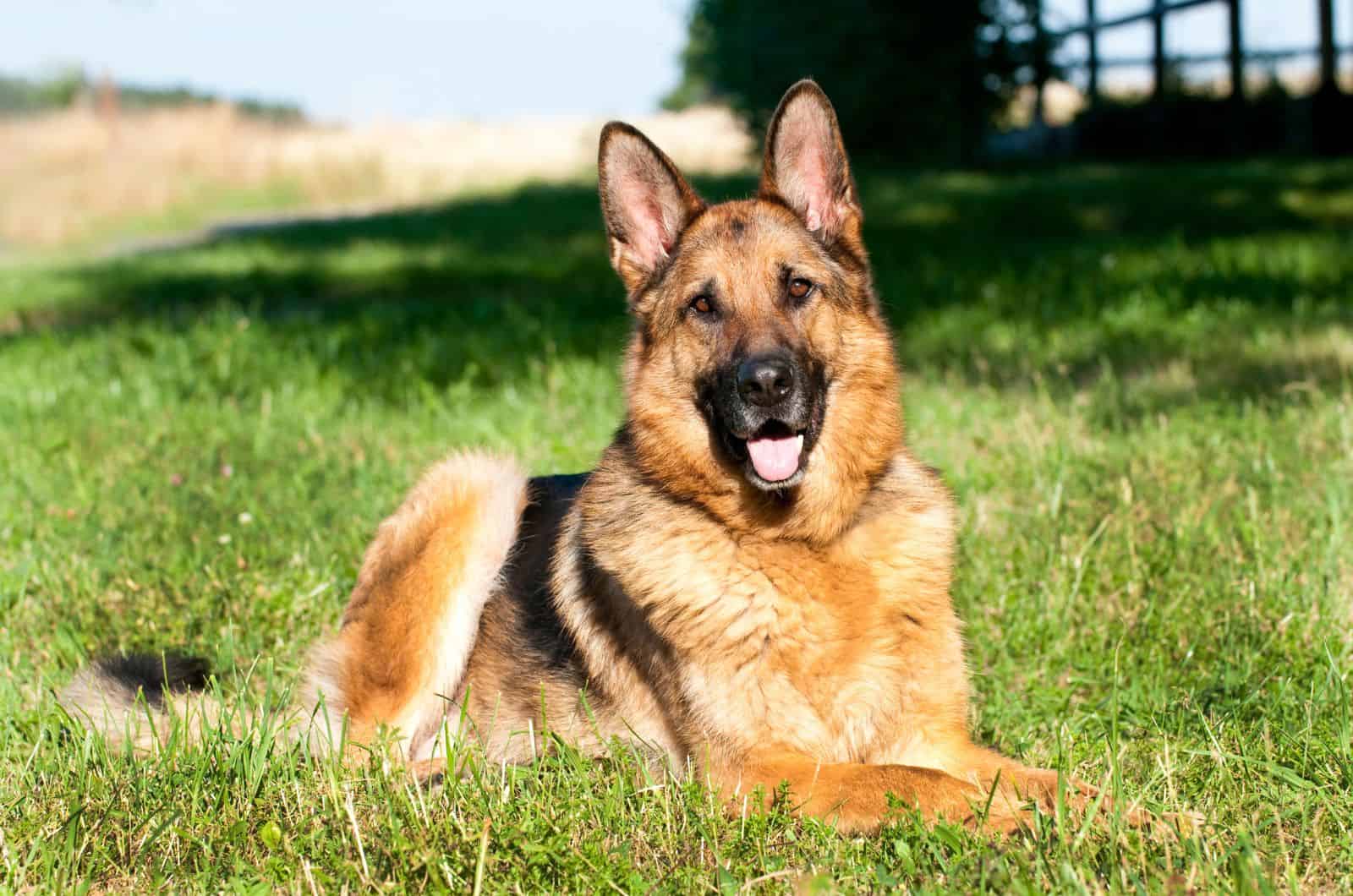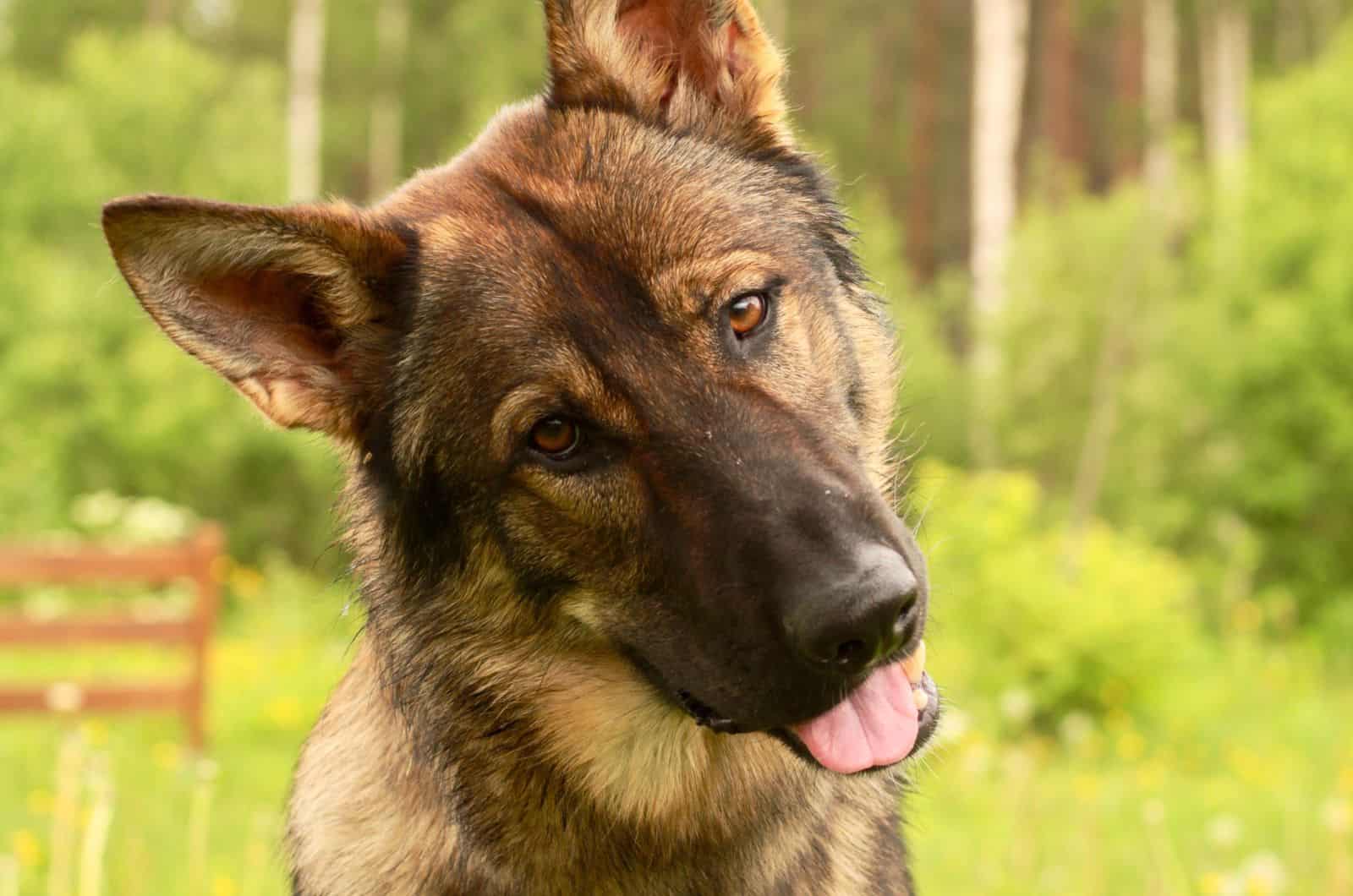Head tilting is not something exclusive to German shepherds. Still, the question has to be asked, why do German shepherds tilt their heads? If you worry something is wrong, rest assured it is probably not.
Although medical reasons can be an answer to why do German shepherds tilt their heads, they are usually not serious and are treated easily. You can tell by the GSD’s body language whether the tilt is due to an underlying health condition or part of their natural behavior.
German shepherd dogs are known to do this more often than other breeds, so we are here to investigate all the possible reasons and answer this burning question. Scroll down to start the journey.
The German Shepherd’s Head Tilt Means…

Head tilts in dogs are a common behavior among German Shepherds, and it can be both endearing and puzzling. This behavior is usually seen when a GSD is trying to understand something or attempting to get more information.
It’s often accompanied by other behaviors such as perking up the ears, raising their eyebrows, or leaning in closer.
German shepherd tilts can also be a sign of curiosity or confusion on the part of the dog. By tilting their head, they are attempting to make sense of what’s happening around them. This behavior can also be used as an attempt to get attention from their owners.
A downside of the breed is its susceptibility to otitis externa. Also known as outer ear infections, this condition can cause a lot of discomfort for your dog, manifested through head tilting and shaking.
However, there is much more nuance in what a head tilt means for breeds like the German shepherd or Greyhound. They have something in common that can help you fully understand this kind of body language, so keep reading to find out why do German shepherds tilt their heads.
1. Itching To Process The Information
Head-tilting behavior in highly intelligent dogs that exhibit more than average social behavior around humans is not a novelty. It has been around for a while, and GSD owners are nearly blind to it.
It happens whenever some new auditory or visual piece of information is presented in front of the dog. There were plenty of theories that believed it aided the German shepherd to better hear what the owner was saying, but it does not make sense when the human is right in front of the dog.
What actually happens is that dogs with long muzzles have a nose right in front of their eyes, so tilting the head makes it easier to see what is going on.
Dogs rely more on their noses and ears to understand their environment, which is why audio location was the prime argument many believed explained head tilting in German shepherds.
Soaking in those soundwaves at different angles to better hear has some substance to it. Unless the dog has hearing loss, there is no reason why it would tilt the entire head when a German shepherd’s ear has a rather wide range of motion in the ear muscles.
A study conducted by doctor Stanley Coren from the University of British Columbia, Vancouver, showed that dogs with short muzzles, like Bulldogs and Pugs, among other brachycephalic breeds, exhibited this behavior much less frequently than dogs with long muzzles.
German shepherd puppies exhibit head tilting while their eyesight is still not fully developed, with the same trend appearing in senior dogs who start experiencing loss of vision. In addition, dogs do not see as many colors as humans, so any extra information is welcomed by their brains.
The study goes on to categorize dogs with more square-shaped heads, like Labrador Retrievers, Boxers, etc., as less likely to tilt their heads than the German shepherd breed or Collies.
Next time your GSD tilts its head while looking at whatever you are doing, it probably wants to get that long muzzle out of the way to get a better visual representation of the event.
2. Looking For Attention And Extending Interaction

Dogs do all kinds of weird things to prolong their interaction with us humans. It is particularly the case with dogs that possess a high level of intelligence, like our GSD over here.
Communication and interaction in the dog world occur through the olfactory system and body language. We, humans, are so poor at understanding body language that there is a separate branch of anthropology called kinesics that studies and interprets how we move.
For dogs, this comes naturally since they do not have a language to convey their thoughts. By now, you probably understand that we are simply oddly shaped dogs for our canine companions.
Naturally, this means we use body language, consciously or unconsciously, to communicate with dogs. However, the work German shepherds have to do to understand what we are telling them with our movement exceeds the effort put in by humans to properly convey the message.
Positive Reinforcement And Learned Behavior
If you are “baby talking” to your GSD, it might tilt its head to see why you are acting that way. It can also mean the dog learned your pattern of behavior and realized that social interaction with humans who blabber like an infant means more time spent together or playtime.
This type of learned behavior is what makes the German shepherd so popular. In the majority of situations, dogs associate a positive experience with the event that immediately preceded it.
Dog training is not the same as involuntary conditioning. The latter happens naturally, and the canine figures it out without any help from the owner. Training is based on a hit-and-miss principle where the dog finds out what behavior yields a reward and which one does not.
Thanks to their big boy brains, it suddenly makes sense to tilt the head even when the nose is not in the way.
3. What Are You Trying To Say, Human?

Processing information is easy when you already know what different sounds mean. Taking a closer look at things to better perceive depth or shape is also great, but a dog tilts its head if it is confused, too.
New information is more taxing on the brain, whether you are a human or a dog. Using hearing, sight, and smell to analyze it is normal in dogs. So, why do German shepherds tilt their heads if they are so smart?
You might not have noticed, but they do much more than that in the process. A head tilt often involves eyebrow and ear movement, Flehmen response, and a soft Scooby Doo inquisitive growl.
We have a great German shepherd ears chart that will potentially help you navigate the ear signalization of a GSD, so have a read to read your dog better.
The tilting of the head is more a sign for the human collocutor that expresses confusion. Perhaps that is a German shepherd’s way of telling us to be more clear in communication. Using all the tools at their disposal, including the familiar head tilting, certainly cannot hurt.
Keep in mind that human facial expressions also play a role in communication with the dog. The human ear has almost no mobility, so we cannot perk up our ears or turn the forward to hear better, but we can tilt our heads to try and focus on the source of the sound.
Think of a head tilt as a loading animation on your screen. If your German shepherd dog is stuck at loading, unplug the power cable and try again.
4. Ear Problems

Unfortunately, German shepherd dogs have a higher incidence of ear infections than many other breeds. The reason for this remains unknown, but the reality is that GSDs will tilt their heads if something is wrong with their hearing or ears.
Having large, erect ears comes with a tax. Paired with their high energy levels and intense physical activity needs, debris can damage the ear, directly causing hearing loss. Ear infections are the most common reason, though.
An ear infection can occur at any time for whatever reason. If you and your GSD take a lot of outdoor trips, soil can be the reason for otitis externa.
Although Staphylococcus is the most frequent bacteria that causes ear infections in dogs, Streptococcus, Enterococcus, Pseudomonas, Proteus, and Corynebacterium are present in many cases.
Sticking their head in the dirt, sniffing around, and scratching their ears with soiled paws all facilitate bacterial or viral infection. A small cut on the surface of the skin is enough for germs to infiltrate the blood stream and spread across the body.
If your dog has recently recovered from an illness or surgery, the chances of ear infection are even greater. Bacteria and viruses love immunocompromised hosts. Untreated otitis externa can spread to the middle and inner ear.
Symptoms Of Ear Infection In German Shepherds
The more serious medical reasons that answer the question, “Why do German shepherds tilt their heads?” include the dreaded ear infection.
While otitis externa can be asymptomatic for a while, head tilting, shaking, and constant scratching of the ear are among the first clinical signs displayed by the dog.
Keep in mind that the tilting will not be situational, but the head will remain tilted for longer periods of time due to the pain in the ear canal. Otitis media or middle ear infection and inner ear infections will have a progressively more prominent tilt as a symptom.
Bacteria can quickly and easily multiply in the tube-shaped ear canal, where moisture and soil can get trapped. Usually, there will be redness, swelling, discharge, and flaky skin in the ear canal, which requires immediate veterinary attention.
Practicing good ear hygiene, avoiding areas where there are wild animals, and keeping your dog healthy with a comprehensive diet and vet-approved supplements will make ear infections a foregone conclusion.
Here are a couple of articles that you could find useful in terms of overall hygiene:
Ear Infection Treatment
Depending on what caused the infection, your veterinarian will prescribe a therapy of oral medication. For outer ear infections, ointments are preferred, as the topical application allows the dose to be concentrated at the site of infection.
In case of a fungal infection, the treatments are oral antifungals or creams. Most medication that fights this type of ailment end in -conazole (Fluconazole, Itraconazole, etc.).
There are also antifungal and antimicrobial shampoos. Their use, however, is restricted to dogs that have weakened immune systems and require an almost sterile coat to prevent the recurrence of infection.
If you feel left out by that, here are the ten healthiest and best shampoos for Huskies. They will work equally well on German shepherds. I tried and tested it.
5. Vestibular Disease

Humans and dogs alike have a vestibular system, which enables us to keep balance and not fall over. Since the parts that constitute it are located in the middle and inner ear (as well as the brain), untreated ear infections can lead to vestibular disease.
Older dogs seem to be more prone to it, but the most common symptoms, regardless of age, are loss of balance, head tilt, nystagmus, and unwillingness to stand.
When the cause is not bacterial, fungal, or viral, the condition is referred to as an idiopathic vestibular syndrome. Both infection-mediated and idiopathic VD have a sudden onset of symptoms, but IVS resolves on its own in the majority of cases.
The treatment consists of curing the underlying condition in case of infection or trauma. In the case of IVS, sedatives are useful in preventing the dog from becoming too stressed or injured due to falling.
Final Thoughts On The Matter

If you tilted your head in contemplation over “Why do German shepherds tilt their heads?”, this article hopefully brought some peace of mind.
For prospective dog owners who thought the German shepherd head tilt was a deal breaker, I believe you have become persuaded to set aside the tilting prejudice and get a GSD for your family.
Similarly, for existing owners of this staple dog breed, your worries about an ear infection causing the tilting are rational but unlikely to happen if you keep your dog healthy and clean.
